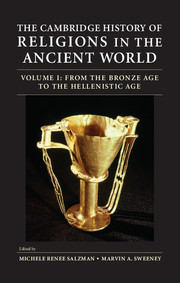Book contents
- Frontmatter
- Contents
- List of Figures and Maps
- List of Contributors
- List of Abbreviations
- Acknowledgments
- Introduction to Volumes I and II
- Introduction to Volume I
- Part I Mesopotamia and the Near East
- Part II Egypt and North Africa
- Part III Greece and the Eastern Mediterranean
- Part IV The Western Mediterranean and Europe
- Suggestions for Further Reading
- General Index
- Index of Citations
- Frontmatter
- Contents
- List of Figures and Maps
- List of Contributors
- List of Abbreviations
- Introduction to Volume II
- Part I Iran and the Near East
- Part II Egypt and North Africa
- 6 Traditional Religion in Ptolemaic and Roman Egypt
- 7 Judaism in Egypt
- 8 Ancient Egyptian Christianity
- 9 Cult and Belief in Punic and Roman Africa
- 10 Christianity in Roman Africa
- Part III Greece and Asia Minor
- Part IV Italy, Roman Gaul, and Spain
- Suggestions for Further Reading
- General Index
- Index of Citations
10 - Christianity in Roman Africa
from Part II - Egypt and North Africa
Published online by Cambridge University Press: 05 October 2013
- Frontmatter
- Contents
- List of Figures and Maps
- List of Contributors
- List of Abbreviations
- Acknowledgments
- Introduction to Volumes I and II
- Introduction to Volume I
- Part I Mesopotamia and the Near East
- Part II Egypt and North Africa
- Part III Greece and the Eastern Mediterranean
- Part IV The Western Mediterranean and Europe
- Suggestions for Further Reading
- General Index
- Index of Citations
- Frontmatter
- Contents
- List of Figures and Maps
- List of Contributors
- List of Abbreviations
- Introduction to Volume II
- Part I Iran and the Near East
- Part II Egypt and North Africa
- 6 Traditional Religion in Ptolemaic and Roman Egypt
- 7 Judaism in Egypt
- 8 Ancient Egyptian Christianity
- 9 Cult and Belief in Punic and Roman Africa
- 10 Christianity in Roman Africa
- Part III Greece and Asia Minor
- Part IV Italy, Roman Gaul, and Spain
- Suggestions for Further Reading
- General Index
- Index of Citations
Summary
Introduction
No one knows exactly how or when Christianity arrived in Africa, and its demise under the Arabs is equally difficult to comprehend. While Christianity in other regions (for example, Egypt, Ethiopia, and Syria) survived under Muslim rule, African Christianity virtually disappeared within a century of the Arab conquest. A history of successive conquests or domination by authorities who demanded religious conformity from the resident population may partly explain the region’s failure to establish a surviving local cult (or “national church”). At first, those authorities were Roman traditionalists who prosecuted Christians as such. Later, however, they were Christians themselves whose theology, ecclesiology, or rituals differed from established local practice. Rather than tolerantly accepting local difference in practice or dogma and being content merely to govern, these rulers sought theological and disciplinary acquiescence among the Christian communities they governed (Donatists, Nicenes, Arians, and Western Chalcedonians in turn). They enforced their demands by legal restrictions, confiscation of buildings and capital, and even persecution of nonconformists.
In each instance, existing Christian communities resisted such impositions, and evolving African churches were repeatedly challenged and transformed in ways that may have undermined the survival of an enduring established community – especially one associated with a dominant ethnic group. Moreover, from its beginnings, resistance to an often hostile secular authority was a hallmark of African Christianity. Thus, consecutive cycles of oppression, in most instances a case of one group of Christians attempting to impose its authority over another, ultimately resulted in the loss of a unified religious identity, either theological or cultural. Eventually, even the faith of the invading Arab Muslims may have seemed no more religiously foreign to indigenous African Christians than those of the previous ruling power – the Byzantine emperor and his delegates.
- Type
- Chapter
- Information
- The Cambridge History of Religions in the Ancient World , pp. 264 - 292Publisher: Cambridge University PressPrint publication year: 2013



